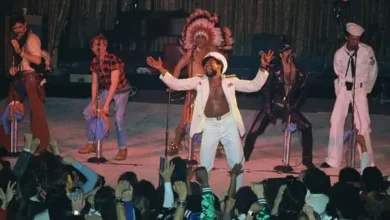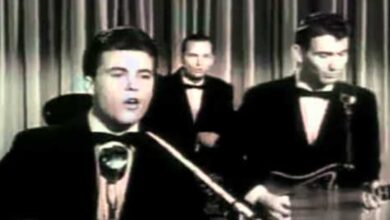Little Richard and the Revolutionary Anthem: The Story of ‘Tutti Frutti’ and the Birth of Rock & Roll
In the vibrant tapestry of 20th-century music, few figures shine as brightly as Little Richard, born Richard Wayne Penniman on December 5, 1932, in Macon, Georgia. As the third of twelve children, Richard’s early life was steeped in the soulful sounds of gospel music, a foundation that would profoundly influence his future musical endeavors. His family’s deep religious roots exposed him to the fervent energy of Pentecostal church services, where he began honing his vocal talents and developing a flair for performance.
Richard’s formative years were marked by a blend of musical exploration and personal challenges. He was drawn to the charismatic worship and live music of Pentecostal churches, which resonated with his burgeoning passion for rhythm and blues. Despite facing societal prejudices and personal adversities, including being mocked for his effeminate appearance and a strained relationship with his father, Richard’s resolve to pursue music remained unshaken.
The turning point in Richard’s career came in September 1955 during a recording session at J&M Studios in New Orleans. Frustrated by a lack of inspiration, Richard spontaneously performed a risqué tune he had been playing at clubs, titled “Tutti Frutti.” Recognizing its potential, producer Robert “Bumps” Blackwell enlisted songwriter Dorothy LaBostrie to sanitize the lyrics for mainstream audiences. The result was a high-octane track that would become a cornerstone of rock and roll history.
Released in November 1955, “Tutti Frutti” was an instant sensation, reaching number two on Billboard’s Rhythm and Blues Best-Sellers chart. Its infectious energy and Richard’s dynamic delivery captivated audiences, breaking racial barriers in a segregated America. The song’s success was not confined to the United States; it also made waves in the United Kingdom, signaling the global appeal of Richard’s revolutionary sound.
The impact of “Tutti Frutti” extended beyond its commercial success. The song’s distinctive rhythm and Richard’s exuberant performance style introduced a new level of intensity to popular music. His raspy, impassioned vocals and frenetic piano playing became defining characteristics of rock and roll, influencing countless artists across genres. The song’s opening exclamation, often transcribed as “A-wop-bop-a-loo-mop-a-lop-bam-boom!”, became an iconic catchphrase, encapsulating the rebellious spirit of the era.
Following the triumph of “Tutti Frutti,” Richard released a string of hits that solidified his status as a rock and roll pioneer. Tracks like “Long Tall Sally,” “Rip It Up,” and “Good Golly, Miss Molly” showcased his ability to blend rhythm and blues with an unbridled energy that was unparalleled at the time. Each release further dismantled racial barriers in the music industry, drawing diverse audiences together in appreciation of his electrifying sound.
Richard’s influence was not limited to his recordings. His flamboyant stage presence, characterized by pompadour hairstyles, makeup, and flashy attire, challenged societal norms and inspired future generations of performers. Artists such as James Brown, Otis Redding, and even the Beatles cited Little Richard as a significant influence on their music and performance styles. His willingness to defy conventions paved the way for greater artistic expression in popular music.
In 1962, after a period of focusing on gospel music, Richard was persuaded to tour Europe, where he experienced a resurgence in popularity. During this tour, a young band named the Beatles opened for him on several dates, absorbing elements of his dynamic performance style. This period underscored Richard’s enduring appeal and his role in shaping the global music landscape.
The legacy of “Tutti Frutti” and Little Richard’s contributions to music have been widely recognized. In 2010, the song was inducted into the Library of Congress’ National Recording Registry, cementing its status as a culturally significant work. Rolling Stone magazine declared that the song “still has the most inspired rock lyric on record,” a testament to its enduring impact.
In 1995, four decades after “Tutti Frutti” first hit the airwaves, Little Richard performed the song at the Concert for the Rock & Roll Hall of Fame. His performance was a testament to his enduring energy and showmanship, captivating audiences and reaffirming his status as a foundational figure in rock and roll. The concert celebrated the legacy of rock music, and Richard’s performance was a highlight, bridging the gap between the genre’s origins and its contemporary evolution.
Throughout his career, Little Richard received numerous accolades honoring his contributions to music. He was among the inaugural inductees into the Rock and Roll Hall of Fame in 1986, a fitting recognition for someone often dubbed the “Architect of Rock and Roll.” His influence permeated various facets of popular culture, from music to fashion, leaving an indelible mark that continues to inspire artists today.
Little Richard’s journey from a young boy singing in church to an international music icon is a testament to his talent, resilience, and unwavering commitment to his art. His ability to transcend societal barriers and connect with audiences of all backgrounds speaks to the universal appeal of his music. Even decades after their release, songs like “Tutti Frutti” continue to resonate, embodying the unbridled joy and rebellious spirit of rock and roll.
Reflecting on his career, Richard once remarked that his music came from the church, infused with the rhythms and fervor of gospel traditions. This foundation, combined with his innovative spirit, allowed him to craft a sound that was both groundbreaking and deeply rooted in American musical traditions. His legacy serves as a reminder of the transformative power of music and the enduring impact of those who dare to push its boundaries.
In the annals of music history, few songs have had the transformative impact of “Tutti Frutti.” Its release marked a seismic shift in popular music, introducing a sound and energy that would influence generations. Little Richard’s fearless artistry and dynamic performances challenged norms and inspired countless artists, cementing his place as a true pioneer.



